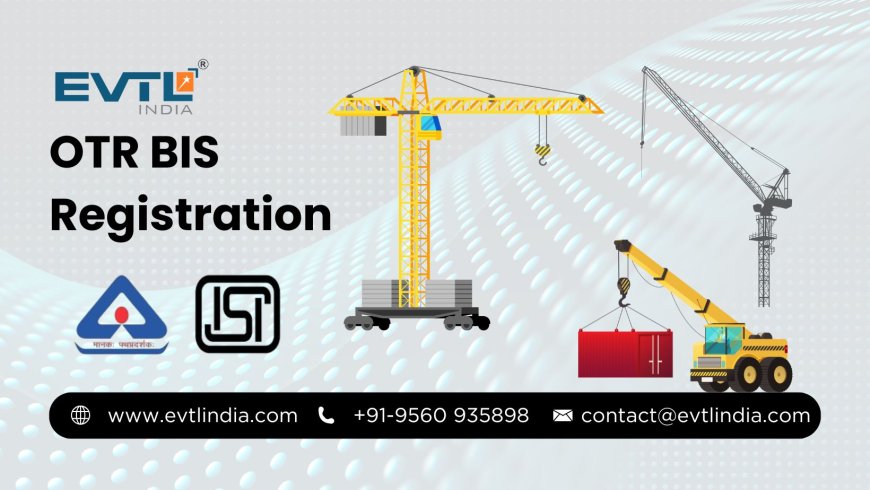Understanding the Complete Process of OTR BIS Registration in India

Indias regulatory environment, especially in terms of quality standards, is evolving rapidly to protect both consumers and manufacturers. One of the latest developments in this journey is the OTR BIS Registration, an important framework introduced by the Bureau of Indian Standards (BIS) for regulating products that are not yet covered under the main certification schemes but are anticipated to be included soon. The OTR (On The Radar) scheme plays a key role in the transition phase for both foreign and domestic manufacturers.
This blog explores the OTR scheme, how it works, and why its vital for manufacturers. It will also guide you through the pre-registration process and the latest QCO updates surrounding the OTR model.
What is the OTR Scheme?
The OTR Scheme stands for "On The Radar", a proactive initiative by the Bureau of Indian Standards to monitor products that are not under the mandatory certification list currently but may be added in the near future.
Under this scheme, BIS keeps a close eye on certain products by engaging with stakeholders, collecting data, testing market samples, and analyzing safety and quality trends. This preemptive monitoring ensures that when a product is eventually brought under mandatory certification, the transition is smooth, informed, and efficient.
Heres why this scheme is significant:
-
It provides manufacturers with early warnings about potential BIS compliance.
-
It allows businesses to prepare their production and documentation in advance.
-
It enables BIS to understand industry challenges before implementing a QCO (Quality Control Order).
Importance of OTR Pre-Registration for Foreign & Domestic Manufacturers
OTR Pre-Registration for Foreign & Domestic Manufacturers is a crucial step introduced by BIS to gather details of entities involved in the manufacturing or import of products that are part of the OTR list.
For domestic manufacturers:
-
Pre-registration offers time to upgrade their facilities to meet Indian standards.
-
They get access to official notifications and BIS communications.
For foreign manufacturers:
-
It helps them align their products with Indian norms.
-
Enables a smoother application process when the QCO is eventually enforced.
This step is advisory but strongly recommended. The earlier a manufacturer completes pre-registration, the better their chances of avoiding last-minute compliance issues, penalties, or even product bans once the certification becomes mandatory.
What Happens After Pre-Registration?
Once a company pre-registers:
-
BIS may contact them for further details or sample submissions.
-
They will be part of an industry-level consultation process before final QCOs are released.
-
They may also receive alerts and draft notifications for new certifications.
Step-by-Step Process of OTR BIS Registration
If your product is listed under the OTR scheme, follow these steps to ensure a hassle-free experience:
Step 1: Check Product Listing
Visit the BIS website and review the official OTR list to confirm if your product is mentioned.
Step 2: Documentation
Prepare the following documents:
-
Manufacturers details
-
Product specifications
-
Production capacity
-
Import/export data (if applicable)
-
Previous test reports (if any)
Step 3: Pre-Registration Submission
Submit the application on the BIS portal under the OTR section with all relevant documents.
Step 4: Communication from BIS
If BIS requires further inputs, they will reach out to you. Sometimes, sample collection may be requested for market surveillance testing.
Step 5: Readiness for QCO
Once BIS announces a BIS OTR QCO, manufacturers will need to apply for full certification within a stipulated time frame, typically 6 to 12 months.
What is BIS OTR QCO?
A BIS OTR QCO (Quality Control Order) is the governments official mandate to bring a product under mandatory BIS certification. After months (or years) of being tracked under the OTR scheme, BIS can publish a QCO to notify that compliance is now compulsory for all products in that category.
When a QCO is issued:
-
Manufacturers must get BIS certification to continue production or import.
-
Non-compliance leads to legal consequences including product bans.
-
Existing stock without the ISI mark may be recalled or rejected by customs.
Examples of products that went from OTR to QCO status include:
-
Smart meters
-
LED modules
-
Specific types of batteries and electrical accessories
Thus, OTR is like a waiting room for compliance QCO is the final call.
How Manufacturers Can Prepare for OTR and QCO
Whether you're a domestic producer or a global brand targeting the Indian market, heres how you can stay ahead:
-
Stay Informed: Regularly monitor the BIS website and updates.
-
Engage a Consultant: Work with BIS experts who specialize in OTR and pre-registration.
-
Upgrade Quality Controls: Adopt global manufacturing standards that align with Indian norms.
-
Conduct Internal Audits: Evaluate your factorys readiness for future BIS audits.
-
Invest in Testing: Proactively test your products at NABL-accredited labs in India.
Choose the Number 1 OTR Agent in India for Seamless Compliance
Navigating the BIS process can be technical, especially for first-time applicants. Whether it's documentation, lab testing, product classification, or QCO interpretation, partnering with the Number 1 OTR Agent in India can save time, money, and stress.
A good OTR agent offers:
-
Complete pre-registration support
-
OTR list analysis and product applicability confirmation
-
Communication handling with BIS officials
-
Assistance during lab testing and sample submission
-
Guidance during the QCO enforcement phase
This kind of support is especially valuable for foreign manufacturers who face language barriers, regulation differences, and logistical complexities.
Latest Updates on OTR BIS and QCO Announcements
As of mid-2025, BIS has expanded its OTR monitoring across electronics, renewable energy devices, medical equipment, and new-age consumer products like wearable tech. The focus is increasingly on safety and sustainability.
Some expected upcoming QCOs include:
-
Home automation systems
-
EV chargers and components
-
Smart agriculture tools
Manufacturers in these categories should take pre-registration seriously, as early compliance can secure their market access for years to come.
Final Words: Proactive Preparation is Better Than Last-Minute Panic
EVTL India is one of the leading BIS Consultant in India, helping manufacturers obtain their BIS licences hassle-free. Indias market is huge, and the regulatory space is evolving. For manufacturers aiming to thrive here, aligning with BIS norms is not optional its a strategic necessity. The OTR BIS Registration process is not just about ticking boxes but about understanding where the industry is headed.
By registering under the OTR scheme, manufacturers signal their readiness to meet Indias quality expectations. Pre-registration, proactive testing, and working with a trusted consultant will ensure youre not just reacting to compliance changes but leading with confidence.
Whether you're a large global enterprise or a growing domestic firm, being prepared today can help you avoid costly delays tomorrow. Take advantage of the OTR window because when the QCO hits, only the prepared will stay in the game.


































